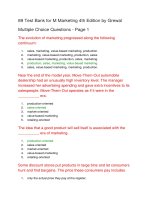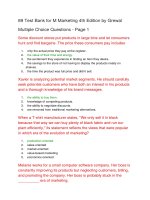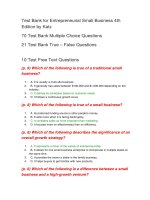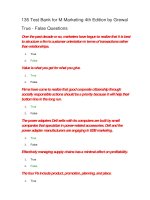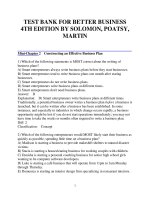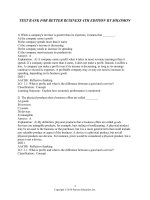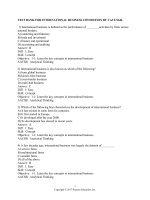M business 4th edition by ferrell hirt test bank
Bạn đang xem bản rút gọn của tài liệu. Xem và tải ngay bản đầy đủ của tài liệu tại đây (792.32 KB, 79 trang )
M: Business 4th edition by O. C. Ferrell, Geoffrey A. Hirt, Linda Ferrell Test Bank
Link full download test bank: />Link full download solution manual: />
Chapter 02: Business Ethics and Social Responsibility
True / False Questions
1.
Business ethics refers to principles and standards that determine acceptable conduct in business
organizations.
True False
2.
Ethics and social responsibility mean the same thing.
True False
3.
All business decisions cannot be judged as right or wrong, ethical or unethical.
True False
4.
The most basic ethical concerns have been codified by laws and regulations that encourage businesses
to conform to society's values and norms.
True False
5.
All a business has to do to maintain ethical conduct is to follow the law.
True False
6.
Only for-profit organizations have to worry about ethics scandals and social responsibility issues.
True False
2-1
Copyright © 2015 McGraw-Hill Education. All rights reserved. No reproduction or distribution without the prior written consent of McGraw-Hill
Education.
7.
An ethical issue is an identifiable problem, situation, or opportunity that requires a person or
organization to choose from among several actions that may be evaluated as ethical or unethical.
True False
8.
One of the principal causes of unethical behavior in organizations is overly aggressive financial or
business objectives.
True False
9.
Since all ethical standards are universally accepted, they do not depend on the culture in which a
business operates.
True False
10. Employees spending their working hours on social networking or shopping sites is not considered as
an area of misconduct observed in the workplace.
True False
11. Like sexual harassment, workplace bullying creates a hostile environment, but unlike sexual
harassment, workplace bullying has little legal recourse at this time.
True False
12. Conflicts of interest are payments, gifts, or special favors intended to influence the outcome of a
decision.
True False
13. Fairness and honesty are at the heart of business ethics and relate to the general values of decision
makers.
True False
2-2
Copyright © 2015 McGraw-Hill Education. All rights reserved. No reproduction or distribution without the prior written consent of McGraw-Hill
Education.
14. Ethical decisions in an organization are influenced by three key factors.
True False
15. Without a code of ethics or formal policy on ethics, employees are likely to base their decisions on
how their peers and superiors behave.
True False
16. Professional codes of ethics are formalized rules and standards that describe what the company
expects of its employees.
True False
17. Establishing and enforcing ethical standards and policies within business can help reduce unethical
behavior by prescribing which activities are acceptable and which are not and by removing the
opportunity to act unethically.
True False
18. There are three dimensions of social responsibility: economic, legal, and ethical.
True False
19. Voluntary responsibilities are optional activities that promote human welfare or goodwill.
True False
20. Corporate citizenship is the extent to which businesses meet the legal, ethical, economic, and
voluntary responsibilities placed on them by their owners.
True False
21. Most companies are introducing eco-friendly and marketing efforts to satisfy consumer demand and
improve their images.
True False
2-3
Copyright © 2015 McGraw-Hill Education. All rights reserved. No reproduction or distribution without the prior written consent of McGraw-Hill
Education.
22. The concept of social responsibility is universally accepted.
True False
23. A major social responsibility for business is providing equal opportunities for all employees.
True False
24. The right to safety requires that businesses provide a safe place for consumers to shop.
True False
25. Sustainability involves conducting activities in such a way as to provide for the long-term well-being of
the natural environment, including all biological entities.
True False
Multiple Choice Questions
26. The principles and standards that determine acceptable conduct in business organizations are referred
to as:
A. social responsibility.
B. business strategies.
C. business ethics.
D. business stances.
E. corporate citizenship.
2-4
Copyright © 2015 McGraw-Hill Education. All rights reserved. No reproduction or distribution without the prior written consent of McGraw-Hill
Education.
27. Which of the following statements is true?
A. All actions deemed unethical by society are also illegal.
B. The concerns of what is legal and ethical do not change over time.
C. The terms social responsibility and ethics should be used interchangeably.
D. Companies can be both profitable and socially responsible.
E. A business whose sole objective is to maximize profits is not likely to consider its social
responsibility, and its activities will also be illegal.
28. The term social
refers to a business's obligation to maximize its positive impact and minimize its
negative impact on society.
A. citizenship
B. strategy
C. ethics
D. responsibility
E. rule
29. The
Act criminalized securities fraud and toughened penalties for corporate fraud.
A. Dodd-Frank
B. Federal Trade Commission
C. Foreign Corrupt Practices
D. Sarbanes-Oxley
E. Sherman Antitrust
2-5
Copyright © 2015 McGraw-Hill Education. All rights reserved. No reproduction or distribution without the prior written consent of McGraw-Hill
Education.
30. Which of the following statements about business ethics is FALSE?
A. It concerns the impact of a business's activities on society.
B. It refers to principles and standards that define acceptable behavior in business organizations.
C. It relates to an individual's values and moral standards and the resulting business decisions he or
she makes.
D. What is ethical is determined by the public, government regulators, interest groups, competitors,
and each individual's personal moral values.
E. Studying it can help one recognize ethical issues and understand how others take unethical
decisions.
31. Studying business ethics will NOT necessarily:
A. help you recognize ethical issues.
B. help you understand the importance of ethical decisions.
C. inform you about the impact of the work group on ethical decisions.
D. describe the ethical decision-making process.
E. motivate individuals to perform acts of social responsibility.
32. The Sarbanes-Oxley Act was passed to:
A. punish those who committed accounting fraud in the late 1990s.
B. improve corporate profits.
C. help laid-off employees get their jobs back.
D. help investors recoup their losses.
E. help restore confidence in corporate America.
2-6
Copyright © 2015 McGraw-Hill Education. All rights reserved. No reproduction or distribution without the prior written consent of McGraw-Hill
Education.
33. One of the most difficult things for a business to restore after an ethics scandal is:
A. regulations.
B. ethics training programs.
C. trust.
D. codes of conduct.
E. morale.
34. Which of the following statements is FALSE about ethics?
A. Ethical issues are limited to for-profit organizations.
B. Business ethics goes beyond legal issues.
C. Ethical conduct builds trust among individuals and in business relationships.
D. Ethical conflicts may evolve into legal disputes.
E. Regardless of what an individual believes about a particular action, if society judges it to be
unethical, that judgment directly affects the organization's ability to achieve its objectives.
35. According to the National Business Ethics Survey,
is the number one area of misconduct
observed in the workplace.
A. plagiarism
B. discrimination
C. abusive behavior
D. misuse of company time
E. stealing
2-7
Copyright © 2015 McGraw-Hill Education. All rights reserved. No reproduction or distribution without the prior written consent of McGraw-Hill
Education.
36. If Laura, a manager, chooses to act so that she benefits financially at the expense of her firm, then she:
A. is bullying.
B. is engaging in bribery.
C. has a conflict of interest.
D. is cheating.
E. has broken the law.
37. The fact that businesspeople are expected not to harm customers, clients, and competitors knowingly
through deception, misrepresentation, coercion, or discrimination is part of:
A. business relationships.
B. communications.
C. conflict of interest.
D. fairness and honesty.
E. consumerism.
38. A video gaming company was investigated for allegedly raising prices of its video game consoles
during the Christmas shopping season and thereby manipulating the supply of games available at that
time. This ethical issue is primarily concerned with:
A. conflict of interest.
B. communications.
C. fairness and honesty.
D. cost control.
E. game rules.
2-8
Copyright © 2015 McGraw-Hill Education. All rights reserved. No reproduction or distribution without the prior written consent of McGraw-Hill
Education.
39. In the realm of business ethics, making claims about dietary supplements or the health benefits of
certain unproven ingredients is an issue related to:
A. conflict of interest.
B. communications.
C. product design.
D. business relationships.
E. financing.
40. Managers use the
of their position to influence employees' decisions and actions.
A. responsibility
B. standards
C. principles
D. authority
E. acceptance
41.
involves taking someone else's work and presenting it as your own.
A. Conflict of interest
B. Bullying
C. Inspiration
D. Bribery
E. Plagiarism
42. The warning on cigarette packages about the health implications of smoking is an example of:
A. conflict of interest.
B. fairness and honesty.
C. communications.
D. relationships within a business.
E. environmental issues.
2-9
Copyright © 2015 McGraw-Hill Education. All rights reserved. No reproduction or distribution without the prior written consent of McGraw-Hill
Education.
43. Which of the following behavior is an example of ethical consideration within the purview business
relationships?
A. Keeping company secrets
B. Communicating with customers
C. Whistleblowing
D. Obeying environmental laws
E. Donating to local charities
44. If a manager pressures a subordinate to engage in activities that he or she may otherwise view as
unethical, such as engaging in accounting fraud or stealing a competitor's secrets, this would be an
ethical issue related to:
A. plagiarism.
B. business relationships.
C. communications.
D. fairness and honesty.
E. conflicts of interest.
45. If an employee learned of a significant cost-saving idea from a coworker and then informed
management of the idea without revealing its true source, then the employee would be involved in:
A. keeping a secret.
B. career advancement.
C. plagiarism.
D. bullying.
E. bribery.
2-10
Copyright © 2015 McGraw-Hill Education. All rights reserved. No reproduction or distribution without the prior written consent of McGraw-Hill
Education.
46. According to the text, ethical decisions in an organization are influenced by individual moral standards,
the influence of managers and co-workers, and the:
A. religious values.
B. informal ethical policies or rules.
C. opportunity to engage in misconduct.
D. family influence.
E. founder's values.
47. Which of the following would help reduce the incidence of unethical behavior in an organization?
A. Understanding individual moral standards, the influence of managers and coworkers, and
opportunity to influence ethical behavior
B. Encouraging supervisors to engage in intimidating behavior when working in groups
C. Limiting the opportunity for misconduct by providing punishments for violations of the rules
D. Overlooking the need to reward employees for following codes of ethics
E. Retaliating against whistleblowers
48. Which of the following is true of ethics?
A. Ethical conflict increases when employees feel that their company is exerting pressure on them to
engage in unethical conduct.
B. Professional codes of ethics are informal rules and standards that describe what the company
expects of its employees.
C. Codes of ethics need to be very detailed so that they take into account every situation.
D. The development of a code of ethics should include only a firm's executives and board of directors.
E. Employees always utilize the same ethical standards at work as they do at home.
2-11
Copyright © 2015 McGraw-Hill Education. All rights reserved. No reproduction or distribution without the prior written consent of McGraw-Hill
Education.
49. A set of formalized rules and standards that describes what a company expects of its employees is
called a(n)
.
A. contractual capacity
B. consumerist code
C. moral philosophy
D. social responsibility
E. code of ethics
50. A code of ethics represents
rules and standards of what a company expects of its employees.
A. unceremonious
B. short-term
C. comprehensive
D. formalized
E. situational
51. Codes of ethics foster ethical behavior by:
A. expanding the opportunity to behave unethically by providing rewards for following the rules.
B. limiting the opportunity to behave unethically by providing punishments for violations of the rules
and standards.
C. limiting the opportunity to behave unethically by providing rewards for following the rules and
standards.
D. expanding the opportunity to behave ethically by providing punishments for following the rules.
E. encouraging employees to bend the rules.
2-12
Copyright © 2015 McGraw-Hill Education. All rights reserved. No reproduction or distribution without the prior written consent of McGraw-Hill
Education.
52. Unethical behavior in business can be reduced if management does all of the following EXCEPT:
A. establish clear policies on unethical behavior.
B. limit opportunities for unethical behavior.
C. establish formal rules and procedures.
D. punish unethical behavior firmly.
E. depend totally on employees' personal ethics.
53. A large number of
cases result in retaliation against the employee, even though the government
has tried to take steps to protect workers and to encourage reporting of misconduct.
A. executive
B. white collar crime
C. whistleblowing
D. petty theft
E. federal
54.
is the act of an employee exposing an employer's wrongdoing to outsiders.
A. Fraud
B. Whistleblowing
C. Plagiarism
D. Bullying
E. A criminal lawsuit
55. Being profitable relates to the dimension of
responsibility.
A. corporate citizenship
B. voluntary
C. ethical
D. legal
E. economic
2-13
Copyright © 2015 McGraw-Hill Education. All rights reserved. No reproduction or distribution without the prior written consent of McGraw-Hill
Education.
56. Obeying the law is a business's
.
A. right
B. choice
C. economic responsibility
D. legal responsibility
E. ethical responsibility
57. Avoiding misconduct and doing what is right, just, and fair relates to a business's:
A. economic responsibility.
B. corporate citizenship.
C. legal responsibility.
D. ethical responsibility.
E. government's responsibility.
58. Which of the following is a dimension of social responsibility?
A. Political
B. Philosophical
C. Mechanical
D. Rational
E. Ethical
59. Being a "good corporate citizen" is an example of the
social responsibility dimension.
A. puritanical
B. economic
C. legal
D. ethical
E. voluntary
2-14
Copyright © 2015 McGraw-Hill Education. All rights reserved. No reproduction or distribution without the prior written consent of McGraw-Hill
Education.
60. Philanthropic contributions made by a business to a charitable organization represent the
dimension of social responsibility.
A. corporate citizenship
B. economic
C. legal
D. ethical
E. voluntary
61.
is the extent to which businesses meet the legal, ethical, economic, and voluntary responsibilities
placed on them by their stakeholders.
A. A code of conduct
B. A code of ethics
C. Business ethics
D. Corporate citizenship
E. Whistleblowing
62. Studies have found a direct link between social responsibility and
in business.
A. profitability
B. ethics
C. declining stock prices
D. happiness of stakeholders
E. global warming
2-15
Copyright © 2015 McGraw-Hill Education. All rights reserved. No reproduction or distribution without the prior written consent of McGraw-Hill
Education.
63.
is defined as the activities that individuals, groups, and organizations undertake to protect their
rights as customers.
A. Consumerism
B. Civil rights
C. Protectionism
D. Conspicuous consumption
E. Shopping
64. Laws regarding workplace safety are enforced by the
.
A. Federal Trade Commission
B. Occupational Safety and Health Administration
C. Environmental Protection Agency
D. Consumer Bill of Rights
E. Corrupt Practices Act
65. A major social responsibility for businesses is providing
for all employees.
A. higher wages
B. equal opportunities
C. more free time
D. better health care
E. equal holiday pay
2-16
Copyright © 2015 McGraw-Hill Education. All rights reserved. No reproduction or distribution without the prior written consent of McGraw-Hill
Education.
66. John F. Kennedy's consumer bill of rights outlined four rights: the right to be informed, the right to
choose, the right to be heard, and the right to:
A. regulations.
B. service.
C. easy credit.
D. shop wherever you want.
E. safety.
67. The
gives consumers the freedom to review all details about the products they wish to buy.
A. right to be informed
B. right to be heard
C. right to purchase
D. right to choose
E. right to speak out
68. Which of the following is true about the right to choose?
A. It ensures that consumers have access to a variety of products and services at competitive prices.
B. It provides the assurance of only satisfactory quality and not service at a fair price.
C. It provides the assurance of only service at a fair price and not satisfactory quality.
D. It ensures the fair treatment of consumers who voice complaints about a purchased product.
E. It ensures that detailed information about ingredients, risks, and instructions for use are printed on
labels and packages.
2-17
Copyright © 2015 McGraw-Hill Education. All rights reserved. No reproduction or distribution without the prior written consent of McGraw-Hill
Education.
69. One role of the Federal Trade Commission's Bureau of Consumer Protection is to protect consumers
from
.
A. ethics
B. fraud
C. laws
D. resource misuse
E. whistleblowing
70.
involves the interaction among nature and individuals, organizations, and business strategies and
includes the assessment and improvement of business strategies, economic sectors, work practices,
technologies, and lifestyles, so that they maintain the health of the natural environment.
A. Philanthropy
B. Consumerism
C. Sustainability
D. Biodiversity
E. Dualism
71. Water and soil pollution from oil and gas drilling is primarily related to
.
A. consumer relations
B. sustainability issues
C. community relations
D. employee relations
E. relations with stockholders
2-18
Copyright © 2015 McGraw-Hill Education. All rights reserved. No reproduction or distribution without the prior written consent of McGraw-Hill
Education.
72. The fact that environmental responsibility requires trade-offs means that it:
A. instigates trade relations.
B. facilitates international competition.
C. generates profits.
D. imposes costs on both business and the public.
E. imposes costs on public sector corporations.
73. The most common way that businesses exercise community responsibility is through:
A. establishing codes of ethics.
B. submission of environmental reports.
C. obeying the law.
D. recycling.
E. contributions to charitable organizations.
74.
refers to attaching a positive environmental association on an unsuitable product, service, or
practice.
A. Greenwashing
B. Whitewashing
C. Environmentalism
D. Corporate citizenship
E. Community relations
2-19
Copyright © 2015 McGraw-Hill Education. All rights reserved. No reproduction or distribution without the prior written consent of McGraw-Hill
Education.
75. Many businesses, recognizing that employees lack basic work skills, are becoming more concerned
about the quality of
in the United States.
A. job opportunities
B. education
C. personal ethics
D. management
E. community relations
Essay Questions
76. What is business ethics?
77. Choose an issue that has been prominently featured in the news and discuss the ethical implications of
this issue. Define any key terms that you use in your response.
2-20
Copyright © 2015 McGraw-Hill Education. All rights reserved. No reproduction or distribution without the prior written consent of McGraw-Hill
Education.
78. Distinguish between the concepts of ethics and social responsibility with suitable examples for each.
79. What are some of the general ethical issues in business?
80. How do you recognize an ethical issue in business?
2-21
Copyright © 2015 McGraw-Hill Education. All rights reserved. No reproduction or distribution without the prior written consent of McGraw-Hill
Education.
81. Nathan, an employee at Shield Corp., bullies new employees in the workplace. In this context, discuss
the kind of misconduct that Nathan engages in.
82. Naomi, an human resource executive with Enigma Corp., bought a pair of sunglasses online during her
office hours. According to this scenario, discuss the kind of misconduct that Naomi had engaged in
and other kinds of misconduct that belong to the same category as per the National Business Ethics
Survey.
83. Kenneth, an assistant pharmacist at Medusa Inc., stole money from the cash counter to purchase
cocaine. In this scenario, discuss the ethics that have been violated by Kenneth in his workplace.
2-22
Copyright © 2015 McGraw-Hill Education. All rights reserved. No reproduction or distribution without the prior written consent of McGraw-Hill
Education.
84. Discuss the ethical issues that can arise in the area of communications.
85. Discuss the role of managers in maintaining and/or disrupting organizational ethics in business
relationships.
86. Discuss the notion of plagiarism in the business context.
2-23
Copyright © 2015 McGraw-Hill Education. All rights reserved. No reproduction or distribution without the prior written consent of McGraw-Hill
Education.
87. Why is it increasingly common for organizations to have a code of ethics and compliance programs?
88. How can an organization improve ethical behavior?
89. Elaborate on the inclusion of the whistleblowing process as part of the ethics program.
2-24
Copyright © 2015 McGraw-Hill Education. All rights reserved. No reproduction or distribution without the prior written consent of McGraw-Hill
Education.
90. What are the four dimensions of social responsibility?
91. Discuss the social responsibility issue of businesses toward its employees.
92. Discuss the four rights specified in the consumer bill of rights proposed by John F. Kennedy in 1962.
2-25
Copyright © 2015 McGraw-Hill Education. All rights reserved. No reproduction or distribution without the prior written consent of McGraw-Hill
Education.
